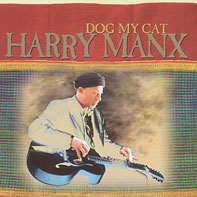 Harry Manx does things differently. Born in the Isle of Man (hence the
chosen surname), he has recently moved back to Canada, where he was
raised. Along the way he has passed back through Europe, Japan, and
Brazil. Most significantly, however, he spent time in India where he
tracked down Vishwa Mohan Bhatt, from whom he learned to play the Mohan
Veena (a cross between a guitar and a sitar). He deploys it on his debut
album, "Dog My Cat," to show how the blues and Indian music can work together.
Harry Manx does things differently. Born in the Isle of Man (hence the
chosen surname), he has recently moved back to Canada, where he was
raised. Along the way he has passed back through Europe, Japan, and
Brazil. Most significantly, however, he spent time in India where he
tracked down Vishwa Mohan Bhatt, from whom he learned to play the Mohan
Veena (a cross between a guitar and a sitar). He deploys it on his debut
album, "Dog My Cat," to show how the blues and Indian music can work together.
The album opens with a swinging version of Muddy Waters' "I Can't Be
Satisfied." As with the rest of the album, Manx plays lap-slide guitar,
and in this instance plays harp too. It shows that Manx is prepared to see
things in a different light, a view which is later reinforced by the
uptempo delivery of Jimmy Reed's "Shame Shame Shame," and the relaxed
country blues version of Big Joe Williams' (not Muddy Waters as the liner
notes suggest) "Baby Please Don't Go."
On the intro (and outro) of the second track, "Bring That Thing," we get a
first glimpse of the Indian influence, albeit on guitar. This is the first
of several original tunes, and Manx's harp playing here calls to mind the
late Al Wilson (from Canned Heat). The album gets its title from the
lyrics of this one. Among the other originals, the pick of the tunes goes
to the fantastic "Brick and Stone" where Manx shows that he is more than
capable of picking up where Kelly Joe Phelps left off after "Shine Eyed
Mister Zen".
The full effect of the Indian influence finally emerges on "Reuben's
Train," where Manx plays Mohan Veena. The sound of the Mohan Veena is one
that will seem familiar even to those that have never heard it before. He
returns to the Mohan Veena on the excellent instrumental "Song For
William," which has an almost Japanese feel to it. It is also used to
great effect on "Rag Bihag (Dusk Rag)" and "Rag Jog (Evening Rag)," which
are ragas rather than blues rags.
The journey for Harry Manx has been a long one, but "Dog My Cat" shows that
it has all been worthwhile. There is a real lived-in feel to Manx's music
that makes it easy to relate to and appreciate. Fans of acoustic blues and
slide will find it most accessible, while those with an open mind about
eastern music will be pleasantly surprised by the sounds of the Mohan Veena
and how it can fit into a blues setting. "Dog My Cat" is a very fine album
which shows that Harry Manx is a name to watch out for. Track his progress
via his web site (www.harrymanx.com) and pick up the CD at Northern Blues
(www.northernblues.com).
This review is copyright © 2001 by Gordon Baxter, and Blues On Stage, all rights reserved. Copy, duplication or download prohibited without written permission. For permission to use this review please send an E-mail to Ray Stiles.
